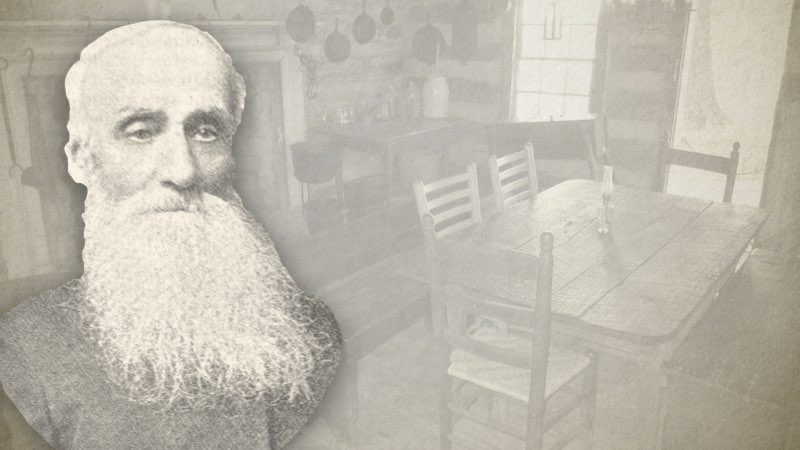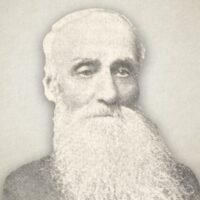
The Life And Ministry Of Robert Abrahams
Earthen Vessel 1893:
Mr. Abrahams, senior deacon of Enon Chapel, Woolwich, departed this life, January 16th, 1893. “The memory of the just is blessed.” Their names are fragrant on earth after they have departed to their heavenly rest. The subject of this grateful tribute was born at Sible Hedingham, Essex, October 2nd, 1817. His father was a godly man, an honourable member of the Baptist Church at Hedingham for many years, and an ardent lover of Christ, His truth and cause. His mother also was a devoted Christian, gentle and loving in disposition. We think our dear brother must have inherited some of the natural qualities of his parents, for these were very conspicuous in his character. But, alas! for him, when quite a boy, he lost a loving mother by death. When old enough he was apprenticed at Halstead, returning home once a week. His brother William, who was three years his senior, frequently waited for his return, in order to read and pray with him. Not that he valued his brother’s prayers at that time, but he prized them in after years, when the bond of brotherhood was cemented by a spiritual relationship. But the prayers of his godly parents and brother had some influence upon him; even then, and in after years, they saw their fervent supplications answered. Soon after he had served his appenticeship, he removed to Woolwich, and married. One Lord’s-day morning he strayed into a Wesleyan Chapel, there the Lord was pleased to awaken him to his state as a guilty sinner. His feet were then directed to Enon, where under the ministry of the deeply revered pastor, Mr. C. Box, his soul was instructed and brought into gospel liberty. We have often heard our brother speak with grateful affection of how much he owed, under God, to the ministry of Mr. Box. He was baptized by him, and joined the Church at Enon in 1839. Thus for the long period of 53 years our dear brother was upheld and continued a consistent member of one church. He at once threw all his energies into the cause of God; his sweet silvery voice (for he was fond of singing) was now devoted to the praises of the most High God. The Lord had saved him and called him by His grace, henceforth his one desire was to serve his Lord. He held the doctrines of grace in love firmly to the end. During 42 years he gave out the hymns, when his health permitted, and the emphasis and pathos of his tremulous tones linger in our memory as we call to mind the deep feeling with which he read the hymns. The last Lord’s-day he attended chapel he gave out “Jerusalem, my happy home,” and the last hymn he gave out was 905 (Stevens), “The sands of time are sinking.” He came to the prayer meeting the following evening, but was too weak to take part, “except announcing,”
“If such the sweetness of the stream,
What must the fountain be,
Where saints and angels drawn their bliss
Immediately from Thee!”
This was his last appearance (in September last) in dear Enon, until his coffin was placed in the chapel where he had so often stood to pray and praise. He was elected deacon in 1853, and for 40 years exercised his office with fidelity and zeal, to the satisfaction of the Church. He was peculiarly adapted to visit the sick, suffering much himself, it enlarged his sympathies, and made him tender of heart and expression. In 1858 he had a very serious illness, but God heard the prayers of the Church and raised him up, though he never recovered his former health. He suffered from chronic bronchitis for more than 30 years. His cough was most distressing at times, causing him many sleepless nights. In 1879 God removed the dear partner of his life. She was a meek, humble follower of the Lamb. He was then in such weak health, that his son William (another honoured deacon of Enon) took his father to live with him, and for the last 14 years he and his dear wife felt it an honour to minister to him, not only as a parent beloved, but also as a servant of God. As they resided some mile or so from the chapel, he was entertained each Lord’s-day by a family living near; each one of the family feeling it a pleasure to add to his comfort; one of them (a dear sister in the Lord), who was baptized in the same year as himself at Enon, now waiting her reunion with many who have gone before. Our brother was a man of few books, but there was one he prized above all others—the Word of God. He was a man of prayer, and his earnest pleadings at the prayer meetings convinced one that he was a man who held habitual communion with God. When he had been a member 50 years, the Church and congregation presented him with a life-size portrait of himself, with other tokens of love and esteem. These he would show to friends with tears of gratitude glistening in his eyes saying, “What have I done that they should shew such love to me?” He felt very depressed at times, especially during the last few months of his earthly pilgrimage, owing chiefly to the exceeding weakness of his body. But when we conversed with him on spiritual things, his face would light up with animation, his soul would rise above his weariness and pain. As he talked of what he had tasted and hoped for of heavenly things, such expressions as the following fell from his lips: “Oh, my Father has been so good to me all through life, especially these 53 years.” “All of grace.” “I thought He would have taken me home before this, He always does right.” “Oh, for more patience!”
“Give me a calm, a thankful heart,
From every murmur free,
The blessings of thy grace impart,
And make me live to Thee.
Let the sweet hope that Thou art mine,
My life and death attend;
Thy presence through my journey shine,
And crown my journey’s end.”
He loved to dwell on Paul’s words in Phil. 3:7-9; the language found there was the ardent desire of his heart. The last Sabbath he spent on earth he held sweet communion with a dear friend, and enquired if there were many at chapel, saying—“Oh, that the friends would attend God’s house more! Would not I be there if I could.” His daughter talked with him on Monday morning about the Sunday evening sermon from the words, “They shall walk with me in white, for they are worthy” (Rev. 3:4). He exclaimed, “Yea, what a mercy! but we are not worthy. Oh, that my Lord would take me to Himself!” His last words were, “What a mercy! Oh, what a mercy! I am going!” He sweetly fell asleep in Jesus about 9 o’clock in the evening. While we were pleading for him at the chapel, he was passing through the pearly gates, to be for ever with the Lord. He now beholds the unveiled glory of Him whom on earth he loved so well. On the Friday following, his dear remains were carried to the chapel, and placed upon the platform, the place where he had so often stood in joyous praise and fervent prayer. At 3 o’clock the sanctuary was nearly filled with sorrowing and sympathising friends; the pastor, E. White, commenced the solemn service with prayer, then announcing hymn 898 (Stevens). After reading some suitable portions of Scripture, he called on Mr. Squirrell, a former pastor, to invoke the Divine blessing for the bereaved family and sorrowing Church. Hymn 906 was sung, “Jerusalem, my happy home.” Mr. Lynn, also a former pastor of Enon, then gave a very suitable address, which was solemn in its warnings, tender in its allusions to the departed, and comforting to the sorrowing. “Forever with the Lord” was then sung. The pastor spoke a few words and pronounced the benediction. A long procession of relatives and friends then proceeded to the tomb, and the pastor committed his body to the grave in sure hope of a joyful resurrection. At 6.30 another service was held in the chapel. After reading and prayer by the pastor, Mr. Squirrell preached an appropriate sermon from Gen. 50:24. On the Sunday evening following, the pastor preached a funeral sermon to a full chapel of sorrowing friends from Matt. 25:21. We shall miss our brother, for he was a true pastor’s friend.
E. White
In Loving Memory Of Robert Abrahams
One more gone home, no longer shall we hear that old familiar voice
Which has for many a year resounded in our ears.
The silent instrument lies now with broken string,
But still the music of that voice lives on;
And shall, as long as earnestness calls forth the sympathy of kindred souls.
Gone home! Yes, home! He knew his Father’s blest abode,
And in the weary watches of the night of earth,
Would call aloud for his loved Elder Brother to appear.
But now he is at home, the frail old earthen vessel soon shall crumble into dust.
He, he! The man! The soul! has soared aloft,
Untrammelled, by the universal force of gravity
To join the revelries, the holy revelries of heaven.
We follow on, or rather we are pressed, and who can tell,
It may be but a step, and we shall soar above,
And view him there, around the family board,
Looking with anxious eyes, as he was wont on earth
For us his brethren to be with him, and although
Our hearts may sink within us when the thought occurs,
That we shall see his face no more on earth;
Yet memory, sweet memory, will evermore present
A duplicate, to stimulate to sweetest reminiscence,
And often as the cares of life press on us we will think
Of that calm, earnest face, and feel that He
Who led dear Robert Abrahams through so many difficulties,
And kept him steadfast to the gates of death,
Will also guide our feet in a safe way, till He
Shall say to us, as He has said to him,
My child, thy hour has come; come home.”
E. T. H.
Enon, Woolwich, Jan. 24, 1893
Robert Abrahams (1817-1893) was a Strict and Particular Baptist deacon. In 1839, he was baptized by John Box, thereafter joining the membership of Enon Chapel, Woolwich, where he remained until his death Fifty-three years later. In 1853, he was appointed a deacon, an office he served for forty years. Given the length of service, he was eventually recognized as the ‘senior deacon’. He was well known among the brethren for a singing voice and a prayerful spirit, both of which were immensely blessed to the people of God during times of corporate worship.



